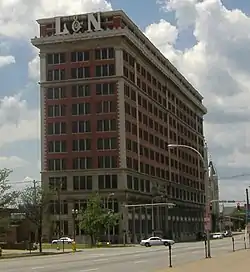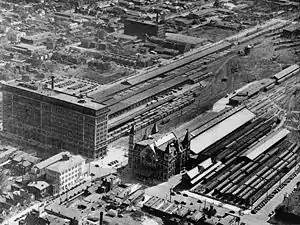Louisville and Nashville Railroad Office Building | |
 | |
  | |
| Location | 908 W. Broadway Louisville, Kentucky |
|---|---|
| Coordinates | 38°14′48″N 85°46′02″W / 38.24667°N 85.76722°W |
| Area | less than one acre |
| Built | 1907 |
| Architect | Haley, J. C. (architect or builder?) Courtenay? |
| Architectural style | Beaux Arts |
| MPS | West Louisville MRA |
| NRHP reference No. | 83002696[1] |
| Added to NRHP | September 8, 1983[1] |
The Louisville and Nashville Railroad Office Building, at 908 W. Broadway in downtown Louisville, Kentucky, is a historic skyscraper building, built in 1907, which is listed on the National Register of Historic Places. It was once the headquarters of the Louisville and Nashville Railroad, a prominent railroad company from the mid-19th century to the 1970s.
Architecture
The structure is eleven stories tall. The first three stories are made of stonework of rusticated ashlar, with capital-topped pilasters in a series. Floors four to ten have ashlar pilasters framing a finish of red brick. Windows of the building are done in series of three. The attic is 1.5 stories tall, and features the distinctive initials of the Louisville and Nashville Railroad.[2]
It was designed by W. H. Courtenay, the chief architect of the Louisville and Nashville Railroad, in a Beaux Arts style; one of the largest commercial buildings in that architectural style still standing.[3][4]
In 1930 an eight-bay western addition which duplicated the look of the original 10-bay building was added, built by then-current chief architect of the Louisville and Nashville Railroad J. C. Haley.[5]
History

The original Louisville and Nashville Railroad offices in Louisville were at Second and Main in Louisville, by the entrance of present-day George Rogers Clark Memorial Bridge. By 1890, it had become obvious that the building was too overcrowded. It was decided that the office building should be located next to Louisville's Union Station. Construction began in 1902, but its completion was delayed until January 1907, due to difficulties with organized labor in a 1905 steel workers strike. Its total cost was $650,000. It was large enough that after decades of separation, all of the main administrative staff could be in the same building.[4]
In the 1970s, about 2,000 L&N employees worked in the building. After L&N was purchased by CSX nearly all of the jobs were moved from Louisville to Jacksonville, Florida, in 1980. However, a 6-person CSX claims department stayed in the building until 1988.[6]
Along with many other buildings, it was listed on the National Register of Historic Places in 1983 as result of a study of historic resources in West Louisville.[1][7] [8]
In 1984, the state of Kentucky spent $15 million to purchase and renovate the property, retaining the L&N name and neon lights on its upper stories.[6]
The building is currently the Louisville offices for the Kentucky Cabinet for Health and Family Services.[9]
References
- 1 2 3 "National Register Information System". National Register of Historic Places. National Park Service. November 2, 2013.
- ↑ Luhan pg.74, 75
- ↑ Luhan, Gregory. Louisville Guide. (Princeton Architectural Press, 2004) pg. 74
- 1 2 Klein, Maury. History of the Louisville & Nashville Railroad. (University Press of Kentucky, 2002). pg.340
- ↑ Luhan pg.74
- 1 2 Hershberg, Ben (1988-11-05). "LAST OF L&N WORKERS ARE LEAVING LANDMARK". Courier-Journal. pp. B12.
- ↑ "National Register of Historic Places Inventory/Nomination: Louisville and Nashville Railroad Office Building". National Park Service. Retrieved January 17, 2023. With accompanying pictures
- ↑ Marty Poynter Hedgepeth (March 1983). "National Register of Historic Places Inventory-Nomination: West Louisville Multiple Resources Area". National Park Service. Retrieved January 17, 2023. PDF includes Kentucky Historic Resources Inventory forms for numerous individual buildings and includes maps showing historic districts and individual buildings which were listed as result of this study.
- ↑ "Resource Directory". Resource Education Across Louisville. Archived from the original on 2011-07-27. Retrieved 2008-07-01.